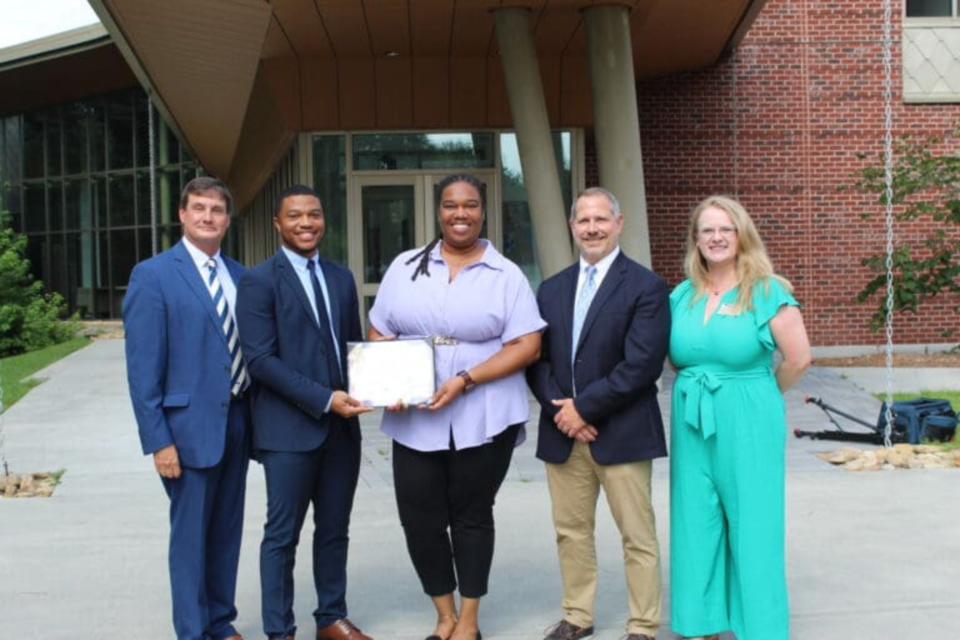Healthy Savannah has officially recognized Georgia Southern University (GS) for providing designated lactation spaces for breastfeeding and nursing students, staff and guests. In a brief ceremony held on Wednesday, July 9, Armand Turner, Healthy Savannah’s executive director, bestowed a certificate of recognition to GS officials at the Health Professions Academic Building, Georgia Southern University Armstrong Campus.
“Georgia Southern University has set a commendable example by offering three lactation rooms at the Armstrong campus here in Savannah as well as three at the Statesboro campus,” said Turner. “We are proud to recognize this University as a breastfeeding-friendly institution, but we also recognize this as an opportunity to invite other Savannah area schools, as well as businesses and service providers, to come to us for guidance in developing breastfeeding-friendly spaces for their staff and those the organization serves.”
Dr. Stuart Tedders, dean of the Jiann-Ping Hsu College of Public Health and Dr. Stephen Rossi, interim dean of the Waters College of Health Professions, accepted the certificate, surrounded by other representatives from Georgia Southern University and Healthy Savannah.
“Georgia Southern has been a longtime community partner with Healthy Savannah and is one of the original collaborators on the REACH grant,” said Nandi A. Marshall, DrPH, MPH, CHES ®, CLC, CDE®. Marshall is the associate dean and associate professor, Health Policy & Community Health, Jiann-Ping Hsu College of Public Health, Georgia Southern University.
Referring to two five-year CDC Racial & Ethnic Approaches to Community Health (REACH) grants to foster sustainable health equity and administered by Healthy Savannah and the YMCA of Coastal Georgia, the first in 2018 and the second in 2023, Marshall has long been a strong advocate in encouraging Savannah area businesses and public post-secondary schools to become compliant with Georgia’s Pump Act Law and Title IX regulations.
Along with co-developer Christina S. Cook, she published a photovoice project in 2023, “Trust Black Women: Using Photovoice to Amplify the Voices of Black Women to Identify and Address Barriers to Breastfeeding in Southeast Georgia.”
“We’re proud to continue supporting breastfeeding-friendly policies and practices—not just in the community, but also right here on campus for our students, faculty, and staff,” said Marshall.
Healthy Savannah launched the “Breastfeeding Welcome Here” initiative earlier in 2025, which provides door decals and certificates of recognition to local organizations that offer reasonable accommodations for breastfeeding and pumping, including break time and private, clean spaces. The initiative also promotes the ease and benefits of adopting breastfeeding-friendly policies. The certificates are suitable for framing and displaying in public spaces such as employee break rooms and visitor waiting rooms.
Currently identified rooms available for use by GS faculty, staff, students, and campus visitors include three at the Armstrong campus and three at the Statesboro campus:
- Armstrong Solms Hall, Room 212
- Armstrong Student Union
- Armstrong Health Professions Academic Building, Room 147
- Statesboro Interdisciplinary Academic Building (IAB), Room 1023
- Statesboro Forest Drive Building, Room 1306
- Statesboro Hendricks Hall, Room 3002
“We have numerous students per year who use GS’s six dedicated lactation rooms,” said Amber Johns Culpepper, J.D, Title IX coordinator, Georgia Southern University. “We strive to provide a supportive and welcoming environment by continuing to grow the number of lactation and parent resources spaces across our campuses, and are additionally committed to supporting anyone who visits to help them find an accessible space, beyond those listed.”
In Georgia, the PUMP for Nursing Mothers Act (also known as Charlotte’s Law) requires employers to provide reasonable break time and a private space, other than a restroom, for employees to express breast milk. This legislation applies to both private employers and state and local government entities, including school districts. The law includes an undue hardship exemption for employers with 50 or fewer employees.
Title IX protects lactating students from discrimination and harassment. It requires schools to provide reasonable accommodations for breastfeeding and pumping, including break time and private, clean spaces. Schools cannot penalize students for absences or academic performance due to lactation needs.




